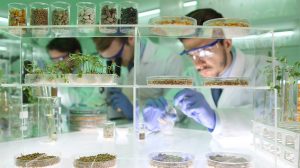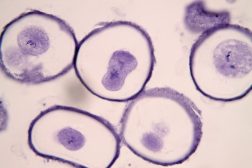Definition
noun, plural: clones
A propagating population of organisms, either single cell or multicellular, derived from a single progenitor cell
clonal
adjective
Of, pertaining to, or associated with a clone
Supplement
A clone is derived from a single progenitor cell that propagates into a population of single-celled or multicellular organisms. Because of this, the clones would be genetically identical. Derived terms such as monoclonal and polyclonal are used especially of a protein or an antibody that are derived from a single clone and multiple clones, respectively.
The process of creating an exact copy of a biological unit (e.g. a DNA sequence, cell, or organism) from which it was derived is referred to as cloning. Cloning occurs naturally. For instance, a plant that reproduces through asexual reproduction (e.g. apomixis) brings about copies of genetically-identical plants. Bacterial cell that divides through binary fission produces clones that are genetically the same as that of the parent cell. Animals capable of parthenogenesis produce clonal offspring.
Clones can also be produced through artificial means. Biotechnological methods are employed to produce such clones. Molecular cloning, for one, is employed so that copies of specific gene fragment are produced. Cellular cloning is carried out to produce single-celled organisms with the exact genetic content of the original cell are produced in cell cultures. Organism cloning, or reproductive cloning, is done to create a multicellular clone through somatic cell nuclear transfer.
Word origin: Ancient Greek klṓn ( “twig”)
See also:
- cloning
- recombinant DNA technology
Related term(s):







